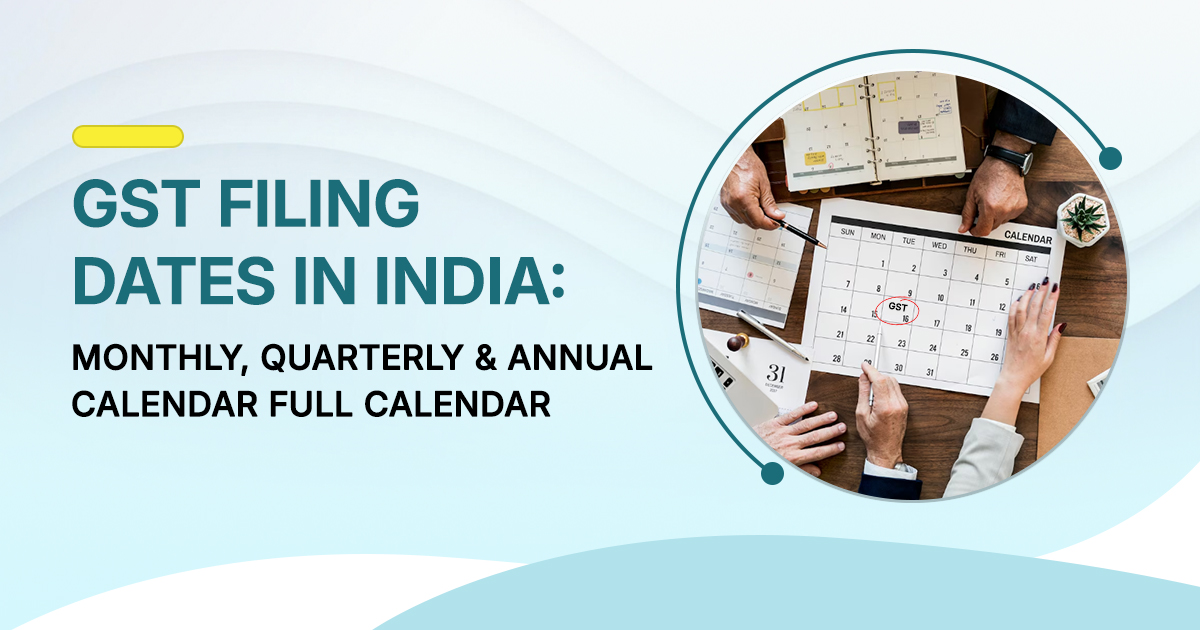Table of Contents1. Introduction |
|
Introduction
If you’re running a business in India, filing your GST returns on time is just as important as paying your taxes. The GST filing dates are structured and mandatory, and every registered taxpayer must follow these deadlines.
Whether you file monthly, quarterly, or annually, knowing the types of GST returns and due dates helps you avoid late fees, interest, and legal hassles. This blog simplifies the GST filing due dates for 2025 - helping business owners, accountants, and freelancers stay compliant without confusion.
Importance of GST Calendar
Filing your GST returns before the last date of GST return is more than just a checkbox - it’s a necessity for business health.
Here’s why tracking GST return due dates is essential:
-
➤ Avoid Late Fees & Penalties: Missing the GST filing last date could result in daily penalties and interest on unpaid tax.
-
➤ Legal Compliance: Staying within the GST return date ensures you're safe from notices and audits.
-
➤ Input Tax Credit (ITC): Timely returns help claim ITC without delay.
-
➤ Compliance Rating: Timely filing may influence your GST compliance score.
- ➤ Banking & Tender Approvals: Banks often request GST return records for loan processing and government tenders.
Being aware of GST due dates allows your business to operate smoothly and grow without interruptions.
Monthly GST Filing Due Dates
Businesses with monthly GST return obligations must file GSTR-1 and GSTR-3B every month. Below is the GST due date chart for 2025:
|
Month |
GSTR-1 (Sales) |
GSTR-3B (Summary & Payment) |
|
January |
11th Feb |
20th Feb |
|
February |
11th Mar |
20th Mar |
|
March |
11th Apr |
20th Apr |
|
April |
11th May |
20th May |
|
May |
11th Jun |
20th Jun |
|
June |
11th Jul |
20th Jul |
|
July |
11th Aug |
20th Aug |
|
August |
11th Sep |
20th Sep |
|
September |
11th Oct |
20th Oct |
|
October |
11th Nov |
20th Nov |
|
November |
11th Dec |
20th Dec |
|
December |
11th Jan (2026) |
20th Jan (2026) |
These are your monthly GST payment due dates and must be adhered to for timely compliance.
Quarterly GST Filing Due Dates
Under the QRMP scheme, small taxpayers can file quarterly returns. However, GST payment due dates still apply monthly through Form PMT-06.
|
Quarter |
GSTR-1 via IFF (Sales) |
GSTR-3B Filing Date |
|
Q1: Apr–Jun |
13th May, 13th Jun |
22nd/24th July* |
|
Q2: Jul–Sep |
13th Aug, 13th Sep |
22nd/24th Oct* |
|
Q3: Oct–Dec |
13th Nov, 13th Dec |
22nd/24th Jan 2026* |
|
Q4: Jan–Mar |
13th Feb, 13th Mar |
22nd/24th Apr 2026* |
These quarterly GST return due dates are crucial for taxpayers under the composition or small business schemes.
Annual GST Filing Due Dates
Annual GST returns provide a year-end snapshot. Missing the GST return filing due date for these forms can attract heavy penalties.
|
Return |
Due Date |
Who Should File |
|
GSTR-9 |
31st Dec 2025 |
Regular taxpayers with turnover > ₹2 crore |
|
GSTR-9C |
31st Dec 2025 |
Taxpayers with turnover > ₹5 crore |
|
GSTR-4 |
30th Apr 2025 |
Composition scheme taxpayers |
These GSTR due dates must be noted and scheduled in advance.
Late Fees & Penalties for Missing Deadlines
Here’s what happens if you miss the GST last date for return or payment:
-
➤ GSTR-1 & 3B: ₹50/day (₹20/day for nil returns)
-
➤ GSTR-9 & 9C: ₹200/day (₹100 CGST + ₹100 SGST)
-
➤ Interest: 18% per annum on the outstanding amount
If the GST return date is extended, check the official GST portal for the latest GST return filing dates to avoid unnecessary charges.
Tips to Stay On Top of GST Deadlines
-
➤ Mark GST filing dates every month on your calendar.
-
➤ Use automated reminders or GST return filing software.
-
➤ Maintain real-time records of your sales and purchases.
-
➤ Avoid filing on the GST filing last date to prevent last-minute issues.
Consult a tax professional to understand the types of GST returns and due dates applicable to you.
Conclusion
GST filing doesn't have to be stressful. Whether you're tracking monthly GST return due dates or checking if the GST return date is extended, staying aware of the latest updates helps you stay compliant and penalty-free.
Review the GST return due date chart regularly, keep documents ready, and aim to file before the GST return date. With discipline and a clear plan, meeting GST due dates becomes second nature - giving your business the confidence to grow without legal or financial setbacks.
Related Topics:
• Avoid These Mistakes in GST Registration Procedure Under GST Notes

